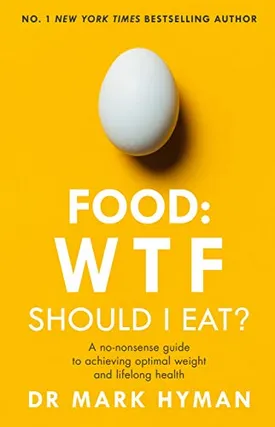Food: WTF Should I Eat?: The no-nonsense guide to achieving optimal weight and lifelong health by Mark Hyman
In "Food: WTF Should I Eat?", Dr. Mark Hyman lays out a comprehensive look at nutrition and health, providing his readers with the information they need to make informed decisions about what they put into their bodies. With a no-nonsense approach to weight loss and lifelong health, he offers practical advice as well as a wealth of scientific evidence to back up his claims.
Hyman begins by introducing the concept of ultra-processed foods, which are those containing a high proportion of added sugars, carbohydrates, fats, and salt. He goes on to warn against these foods, citing research which shows them to be linked to obesity and other health issues. Instead, Hyman recommends a diet focused on whole foods and healthy fats, such as good quality fish, nuts, and vegetable oils.
The author then provides information about specific vitamins, minerals, and other nutrients, explaining their importance for overall health. He also explains how artificial sweeteners, such as aspartame, may be harmful, while honey and unrefined sweeteners contribute to better health. Similarly, Hyman outlines which food additives, such as nitrates, can have a negative effect on health.
In the following chapters, Hyman delves further into diet specifics, detailing the types of fats and carbohydrates which are beneficial for health. His focus on healthy fats and high-fiber carbohydrates eliminates some commonly-held misconceptions about diet. He also makes the case against processed foods, and the prevalence of sodas, chips, and other products high in sugar and salt.
Hyman then looks at how specific diets, such as low-carb and whole foods, can be beneficial. He explains how low-carb diets can help people with diabetes and those who are trying to lose weight, as well as how whole-foods diets can provide essential nutrients for health.
Finally, Hyman looks at how food affects the mind and emotions. He explains that certain fatty acids and amino acids have positive psychological effects and can help reduce anxiety and depression. He also outlines how certain diets can reduce inflammation in the body, a factor which is important in health and in reducing the risk of chronic diseases.
In conclusion, "Food: WTF Should I Eat?" is an informative book packed with scientific evidence and practical advice. Whether you’re looking to lose weight or just find out more about nutrition, Hyman’s no-nonsense approach offers an easy-to-follow guide to achieving optimal health.

